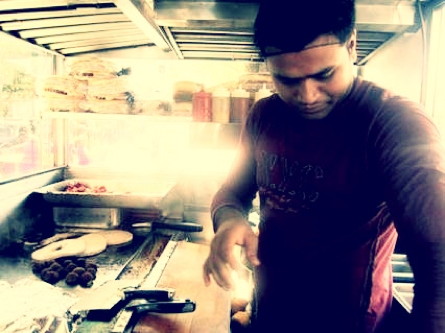
Salam Nabi, a halal street food vendor, has never voted in a city election because, as he puts, he has "no idea how it works."
The native Bengali speaker works in Jackson Heights, Queens, where the neighborhood is dotted with boutiques of shimmering saris, bustling convenience stores and outdoor grocery stores — many with employees speaking in South Asian languages.
He blames his lack of understanding of the democratic process, in part, on his limited English.
Nabi and other South Asian voters in Queens may have a bit of an easier time navigating the polls beginning with today’s primary.
That’s because translators and phone operators who speak Bengali, Punjabi and Hindi are expected to be made available in Queens for the first time under a federal mandate. Voting signs will also be translated into the three languages.
But there may still be an obstacle for many: No ballot will be made available in any Indo-Asian language just yet. While the city’s Board of Election has proposed creating Bengali-language ballots, the agency’s commissioners have not finalized a design. The BOE hopes to have them available for November's election.
Nabi, 21, said the addition of Bengali as a language on the ballot would make a big difference for him. “I would vote now,” he said, as he looked outside the window of his steamy halal cart.
The choice of Bengali for the ballots, however, has not been without its critics.
Some South Asian activists wonder why the more widely spoken Hindi was not also chosen to be on the ballot or why more than one language could not be chosen -- reflecting some of the complications of creating voting materials in a city of millions of immigrants speaking dozens of different languages.
Federal Mandate for South Asian Languages
Last fall, the Department of Justice, acting under The Votering Rights Act of 1965, mandated that the city's Board of Elections provide written language assistance for an Indo-Asian language in Queens.
Bengali was chosen because census data indicated speakers of the language were more likely to have limited knowledge of English. The city’s Bengali, Punjabi and Hindi speakers are primarily located in Queens.
BOE spokeswoman Valerie Vazquez said the BOE's interim plan to provide Indo-Asian language assistance in Queens was adopted in mid-April.
She said the goal is to have signage translated and poll workers who can speak Bengali, Hindi and Punjabi in "only the identified areas in Queens covered by city planning such as Jackson Heights and Rosedale,” for today’s primary.
The plan includes recruiting two full-time Bengali translators; two Bengali and two Hindi phone operators; and Bengali Election Day interpreters. The plan also stated that the Board “will make a best effort” to recruit Hindi interpreters who also speak Punjabi for Election Day.
Thus far, 66 Bengali interpreters and 98 Hindi interpreters, many of whom also speak Punjabi, have been hired for Election Day, said BOE Deputy Director Dawn Sandow.
However, recruiting permanent staff who speak all three languages and meet federal requirements to work as phone clerks and translators has proven problematic.
"We interviewed two applicants and both were not comfortable with the level of written translation that we require,” Rachel Knipel, a member of the BOE's contracting office, said at a public meeting on June 19.
Counsel Steven Richman also wondered whether some applicants may be legal residents, not citizens – making them ineligible to vote.
A Debate Over Indo-Asian Languages
A number of Queens and South Asian community organizers and groups have praised the BOE for recognizing the large number of South Asians in Queens and their need for voting language assistance.
However, the BOE may run into a few challenges by choosing just one of three major Indo-Asian languages to be on the ballot.
During the initial meetings with the BOE regarding the new addition of Indo-Asian languages, community organizations seemed to have differing opinions on how they should choose which language to use on the written ballot.
Jerry Vattamala, a staff attorney with the Asian American Legal Defense and Education Fund, said they had suggested Bengali since speakers of the language often don’t have strong English skills.
But Gurpal Singh, the executive director of SEVA NY, a South Asian organization operating in Richmond Hill, Queens, said the BOE's commissioners had been "very academic in their approach” by choosing Bengali, rather than taking into account the realities of the neighborhoods themselves.
“If you really want to serve South Asians in Queens, you should do both languages, Bengali and Hindi," he said. He said the “BOE is only doing the bare minimum to comply with the federal law” and that “even before the meetings, it seemed like the BOE already picked Bengali.”
Anil Kumar, a soft-spoken cashier in a Hindu puja store that is stocked with statues of deities, flowered garlands, prayer books and other religious trinkets, has been a citizen in the U.S. for 18 years.
He had heard of the plans to add Bengali to the Queens ballot. "We definitely need it," Kumar said. "It would be more easier to understand all of the citizens of New York.”
Kumar, 56, of Jamaica, Queens, is a native Gujurati speaker with limited English skills, and first voted in the city ten years ago. He recalled the experience as "difficult."
He said one of his main concerns of participating in elections with limited English is that his vote might be wasted because he might pick the wrong person.
“Sometimes it goes to waste, to whom we want to vote. Sometimes the vote does not go to them," he said. Kumar said that assistance for Gujurati speakers should also be made available at the polls.
“Although Hindi is the mother language, Gujurati people also need their own language," he said.
___
Kamelia Kilawan is a Jeannette K. Watson Fellow and a student at Baruch College studying journalism and religion and culture.




